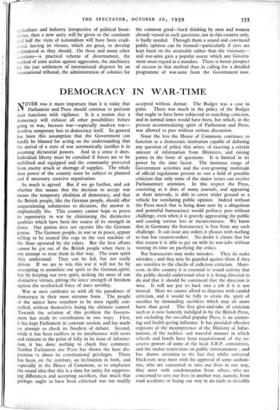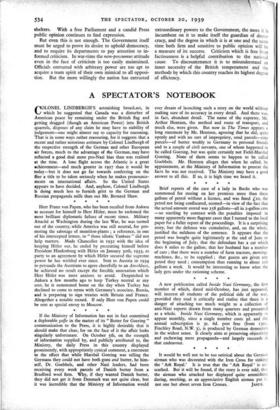DEMOCRACY IN WAR-TIME
NEVER was it more important than it is today that Parliament and Press should continue to perform their functions with vigilance. It is a truism that a democracy will exhaust all other possibilities before going to war, because war—especially modern war— involves temporary loss to democracy itself. So general has been this assumption that the Government can hardly be blamed for acting on the understanding that the arrival of a state of war automatically justifies it in assuming dictatorial powers. And in a sense it does. Individual liberty must be curtailed if forces are to be mobilised and equipped and the community protected from enemy attack or shortage of supplies. The whole man power of the country must be subject to planned and if necessary coercive organisation.
So much is agreed. But if we go further, and ask whether this means that the decision to accept war means the temporary abolition of democracy, and that the British people, like the German people, should offer unquestioning submission to dictators, the answer is emphatically No. This country cannot hope to prove its superiority in war by eliminating the distinctive qualities which have been the source of its strength in peace. Our genius does not operate like the German genius. The German people, in war or in peace, appear willing to be treated like cogs in the vast machine of the State operated by the rulers. But the best efforts cannot be got out of the British people when there is any attempt to treat them in that way. The team spirit they understand. They can be led, but not easily driven. If we are to win this war it will not be by attempting to assimilate our spirit to the German,spirit, but by keeping our own spirit, making the most of our distinctive virtues, pitting the inner strength of freedom against the mechanical force of mass servility.
War at once confronts us with all the paradoxes of democracy in their most extreme form. The people of the nation have somehow to be most rigidly con- trolled, without themselves losing the ultimate control. Towards the solution of this problem the Govern- ment has made its contribution in two ways. First, it has kept Parliament in constant session, and has made no attempt to check its freedom of debate. Second, while it has been ruthless in its interference with news and reticent to the point of folly in its issue of informa- tion, it has done nothing to check free comment. Neither Parliament nor Press has shown the least dis- position to abuse its constitutional privileges. There has been, on the contrary, an inclination in both, and especially in the House of Commons, so to emphasise the sound idea that this is a time for unity, for suppress- ing differences and accepting sacrifices, that much that perhaps ought to have been criticised was too readily accepted without demur. The Budget was a case in point. There was much in the policy of the Budget that ought to have been subjected to searching criticism, and in normal times would have been, but which, in the present accommodating spirit of Parliament and Press, was allowed to pass without serious discussion.
None the less the House of Commons continues to function as a democratic institution capable of debating any question of policy that arises, of exacting a certain amount of information from Ministers, and raising points in the form of questions. It is limited in its power by the time factor. The immense range of Government activities and the ever-growing multitude of official regulations present so vast a field of possible criticism that only some of the major issues can receive Parliamentary attention. In this respect the Press, consisting as it does of many journals, and appearing at short intervals, is able to cover wider ground as a vehicle for ventilating public opinion. Indeed without the Press much that is being done now by a ubiquitous and powerful bureaucracy would perforce pass without challenge, even when it is gravely aggravating the public and causing serious loss or inconvenience. We know that in Germany the bureaucracy is free from any such challenge. It can issue any orders it pleases with nothing to fear but counter-orders. No doubt it claims that for that reason it is able to get on with its war-jobs without wasting its time on pacifying the critics.
But bureaucrats may make mistakes. They do make mistakes ; and they may be guarded against them if they are sensitive to the checks of judicious criticism. More- over, in this country it is essential to sound activity that the public should understand what it is being directed to do and that it should be convinced that the direction is wise. It will not put its back into a job if it is not trusted. Here we cannot afford to dispense with candid criticism, and it would be folly to strain the spirit of sacrifice by demanding sacrifices which may do more harm than good. The free give-and-take of criticism such as is now honestly indulged in by the British Press, not excluding the so-called popular Press, is an animat- ing and health-giving influence. It has provided effective exposure of the incompetence of the Ministry of Infor- mation, of the reckless and wasteful manner in which schools and hotels have been requisitioned, of the ex- cessive powers of some of the local A.R.P. committees, and the undue restrictions on public entertainment ; and has drawn attention to the fact that whilst universal black-outs may meet with the approval of some authori- ties, who are concerned to save our lives in one way, they meet with condemnation from others, who are concerned to save our lives in another way, namely, from road accidents or losing our way in air-raids to invisible shelters. With a free Parliament and a candid Press public opinion continues to find expression.
But even this is not enough. The Government itself must be urged to prove its desire to uphold democracy, and to require its departments to pay attention to in- formed criticism. In war-time the non-possumus attitude even in the face of criticism is too easily maintained. Officials entrusted with arbitrary power are too apt to acquire a team spirit of their own inimical to all opposi- tion. But the more willingly the nation has entrusted extraordinary powers to the Government, the more it is incumbent on it to make itself the guardian of demo- cracy, and the degree in which it is at one and the same time both firm and sensitive to public opinion will be a measure of its success. Criticism which is free from factiousness is a helpful contribution to the national cause. To discountenance it is to misunderstand an inner necessity of the British temperament and the methods by which this country reaches its highest degree of efficiency.













































 Previous page
Previous page